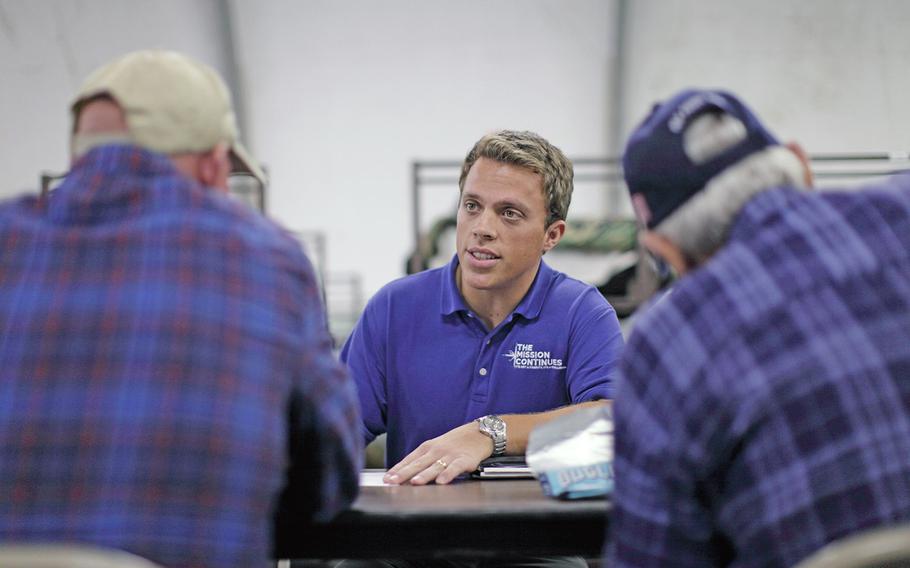
Navy veteran Tristan Williamson speaks to homeless veterans during a service project in San Diego earlier this year. Williamson, a former Mission Continues fellow, is heading up one of the group's new service platoons. (Courtesy of Mission Continues)
WASHINGTON — Tristan Williamson has been out of the military for five years, but he’s back in a platoon.
This time, the Navy veteran is fighting hunger, not the enemy.
Williamson’s platoon — 20-plus veterans, already at work on community gardens in San Diego — is among the first of what Mission Continues officials hope will be dozens of neighborhood outreach groups led by veterans.
The nonprofit group launched its new service platoons initiative this week. Officials have dubbed it a veterans’ report-for-duty call, with veterans trained in charitable work leading chapters in 30 cities.
It’s an extension of the group’s existing goal of engaging veterans through community service, often in areas with limited military presence and even less knowledge of the challenges troops face returning to civilian life.
The idea of second service for veterans has emerged as a theme in recent years, with the first combat generation of the all-volunteer force slowly leaving the military but retaining ideals of civic duty.
“It’s different, because we probably can’t make a big change right away,” said Williamson, a Navy veteran and former Mission Continues fellow. “But there’s this feeling, as we get more veterans engaged, together we can start to change the whole landscape.”
Spencer Kympton, president of Mission Continues, said engaging those veterans in community outreach replaces some of the familiarity and fulfillment of military service. It provides new goals and a new support structure.
“It gives them a new unit here at home,” he said.
Unlike the Mission Continues fellowship program — which provides living stipends for veterans to work on existing charitable projects in their hometowns — the service platoons will see some financial support but mostly rely on planning, fundraising and the labor of local volunteers.
Veterans will commit at least one day a month to projects chosen by their groups. Platoon leaders will receive training and pledge to lead their service startups for at least one year.
Mission Continues officials will monitor the local impact of the veterans’ work but said they won’t be guiding the priorities or focus. The hope is to have veterans identify top local needs and engage with community leaders, other charities and nearby residents to fix the problems.
Vu Nguyen, a former sailor who is heading up the effort in Washington, has sketched out plans for work at area food banks for his platoon.
Combatting childhood hunger has been his passion for years, and the platoon program has given him a new opportunity to address that.
“And it’s about keeping engaged and finding other veterans who want to continue to serve,” Nguyen said. “There are a lot [of veterans] out there willing to help and who want to help their community but don’t know how.”
Volunteers have mainly been from the Iraq and Afghanistan generation but include some older veterans.
In Phoenix, the local Mission Continues platoon project will focus on homelessness. In San Diego — where Williamson is leading the effort — veterans are setting up community gardens and teaching locals about nutrition.
Williamson said his veteran volunteers have been a mix of Mission Continues alumni and younger veterans who are eager for a chance to be on a team again.
Several have voiced the same question — “What do we do now?” — that Williamson asked himself when he left the Navy, before he joined the group.
“It’s not just making an impact,” he said. “It’s being of service with your military brothers and sisters again.”
More information on the service platoons can be found on the Mission Continues website.
shane.leo@stripes.com Twitter: @LeoShane